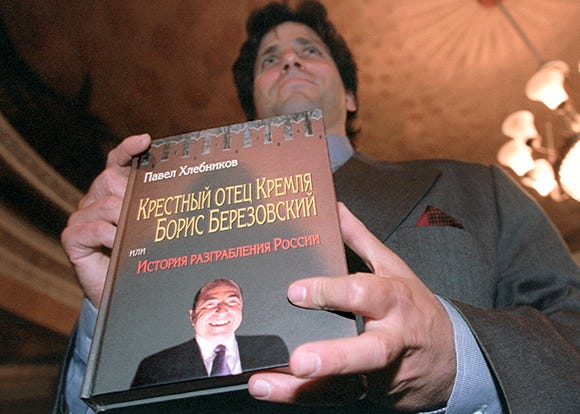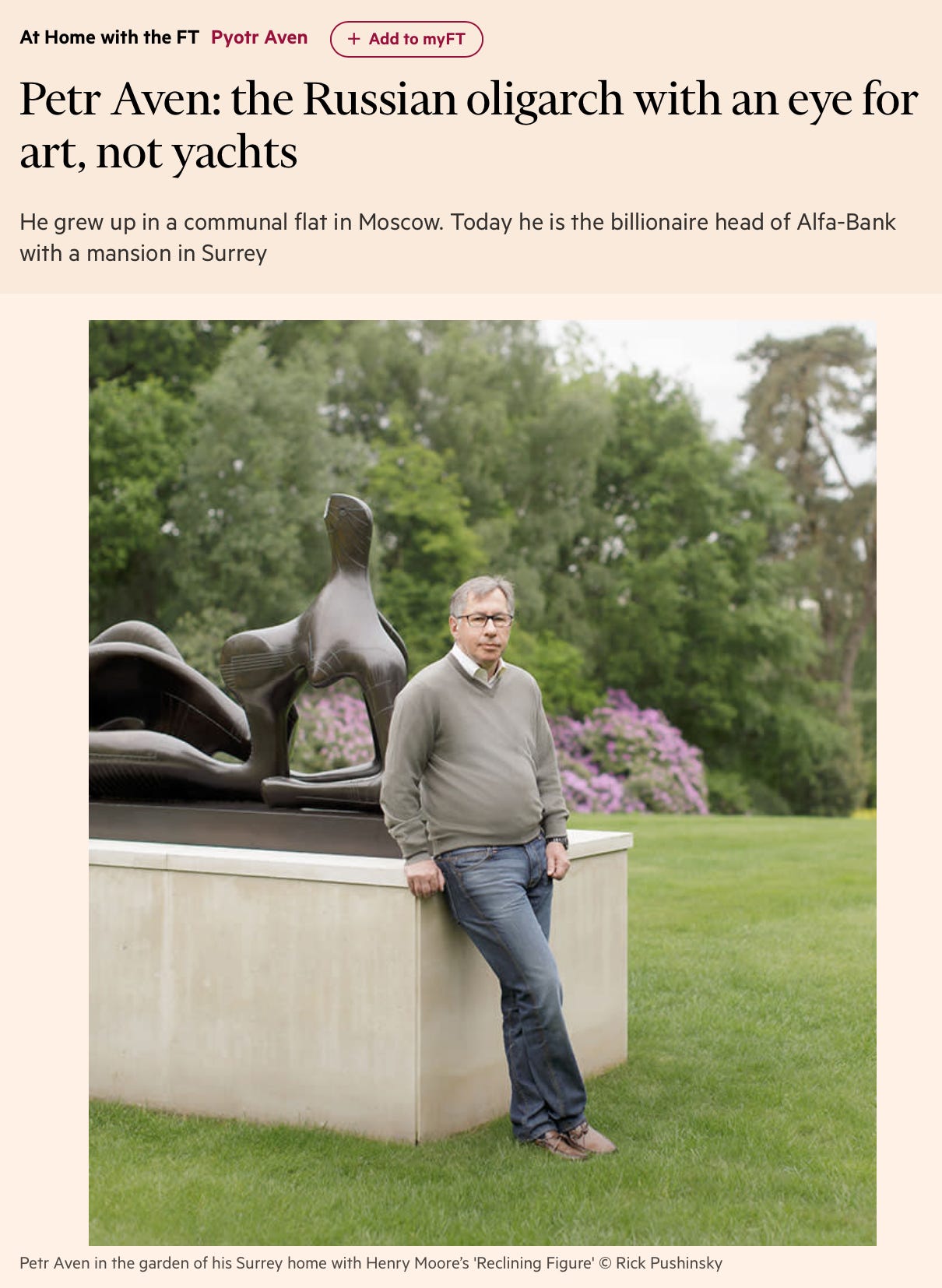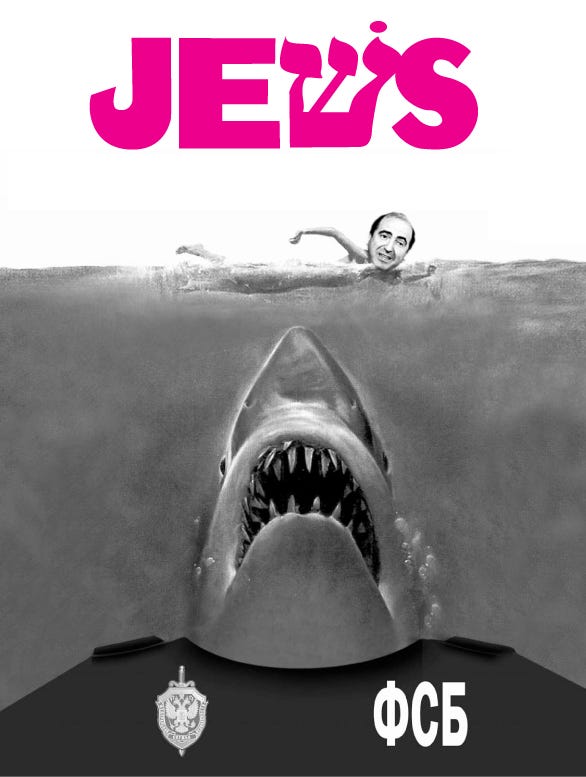Since I’ve been writing more about Russia and the 1990s, people have been asking me for recs about good history/journalism books in English that can provide context to what happened there. Well, there aren’t very many. And I guess that’s not surprising. What America did in Russia was a crime of monster proportions — a crime that was at the time sold as a beneficial humanitarian mission, and then erased from cultural memory when things went wrong.
There is one book that does stand out, though. It was written by an American journalist named Paul Klebnikov, an upper-class descendant of White Russian emigres who had fled the Russian Revolution and eventually ended up in New York.
Paul’s great-grandfather was an admiral who was killed during a mutiny by Bolshevik sailors, while an older ancestor of his was a famous young officer who took part in the Decembrist Revolt, a failed liberal military coup against Czar Nicholas I. And Paul himself came to a glorious end, too. He was shot to death outside his apartment building in Moscow in 2004 — four bullets to the chest. It looked like a professional hit. The murder was never solved, although it was probably tied to a book he had just then published in Russian about a Chechen warlord and mafia boss.
So the man had some guts and he came with a certificate of top-of-the-line pedigree. And he also wrote a pretty damn good book.

It’s called Godfather of the Kremlin, a biography of Boris Berezovsky — Russia’s most powerful and most theatrical oligarch. Boris was a truly impressive character. He was like someone out of Greek epic. He lived the highs and the lows. He was favored by the gods and then abandoned by them. He gambled everything and eventually lost big. He ended up hanging himself in a bathroom in London, although some people are convinced Boris was whacked.
Godfather of the Kremlin is about more than just Boris Berezovsky. It was published in 2000, right as Putin was taking power, and it looks at Russia’s transformation from Mikhail Gorbachev’s bungled presetroika and economic liberalization, through the “authorized” plunder of the Yeltsin years. More than anything it’s about how the elite of the Soviet union joined hands with the KGB, early organized crime syndicates, and western finance goons to transform itself into the oligarchy of a new capitalist Russia.
The book gives a glimpse of how they did it, and it goes through many of the main characters involved — the Russian mobsters, the Chechen gangs, the beige communist academics who leveraged their insider access to redirect vast amounts of Soviet wealth into their offshore bank accounts. Some of these people are now dead or exiled, but a lot of them are still around today as oligarchs — enjoying wealth and power under Putin. Some of them — like the Pyotr Aven, a sleazy accountant crook — are respected as philanthropists and art collectors.

Financial Times
When Evgenia and I lived in Manhattan a few years back, we caught an exhibit at the Neue Galerie, where Pyotr showcased his huge collection of early 20th century German and Russian art. This was before Donald Trump won in 2016, so he wasn’t yet reviled as a dangerous Russian oligarch undermining western democracy with art. He was celebrated in America as a “Russian collector” bringing culture to the masses. And the art was great, but the collection was obscene. It was all purchased with money stolen from the Soviet people — a crime put on display for all to see in a gallery across the street from the Central Park. Godfather of the Kremlin gives you a sense of where that money came from.
Anyway, what’s great about Paul’s perspective is that it doesn’t fit into the normal American — or even Russian — liberal view of Russia at at the time. He didn’t do the usual cliches and platitudes about democracy and liberation and freedom. And he had a lot of empathy for people who were broken by the transition to a “free” Russia. Empathy for Russians? From a journalist? You don’t see that very often!
I’ll quote a few pages:

The book’s generally great, but it does have some flaws: One is that it gives almost no space to America’s deep involvement in the Rape of Russia. The other is that it has kinda comic antisemitic and Russian chauvinist vibes. Both of these flaws are actually very instructive, betraying the biases of Paul’s elite American-White Russian background.
The fact that he had a giant blind spot for the malign effects of American meddling is not surprising. He grew up in an upper-class Manhattan emigre world of finance, spies, and American imperial management. His own father-in-law was John Train — a spooky banker who helped set up the Paris Review, funneled money to the mujahideen in Afghanistan, and was involved in all sorts of anti-communist CIA-linked propaganda and misinformation campaigns, according to Joel Whitney’s Finks. And some of Paul’s closest friends were involved as principal characters in the looting of Russia’s economy — including a fellow White Russian huckster by the name of Boris Jordan, whose name now adorns NYU’s “Jordan Center for the Advanced Study of Russia.”
Despite being critical of what happened in Russia, Paul clearly believed in the beneficial powers of “free-markets” to create free and prosperous societies. He was a huge fan of Pyotr Stolypin, the Pinochet of the late Romanov Era. He thought that Mikhail Gorbachev’s reforms would be similar to what Stolypin tried to do. He thought that they’d unleash good market forces, tap the energy of private enterprise, and ultimately lead to a national economic and cultural revival. But he quickly realized the opposite was happening: privatization and deregulation wasn’t leading to increased prosperity, but to criminality and looting and the destruction of Soviet wealth on a vast scale.
The question is why did this happen? Why did “liberalization” fail?
It’s the central question, Paul doesn’t delve too deeply into the politics or history of it. He makes it personal, rather than structural or cultural. To him things went bad mostly because of organized crime, greedy peasants, and devious foreigners. Not the American or European kind of foreigners, but bad local “foreigners” — in this case, a cunning and brilliant Soviet Jew (but also lots of Soviet Chechens).
As he wrote in the intro:
Behind every historic process stand specific individuals. I wanted to know who Russia’s real bosses were. Who had brought the country to such a state? Who stood at the top of the pyramid?
In the autumn of 1996, I began looking into the affairs of Boris Berezovsky. No man stood closer to all three authorities at once: crime, commerce, and government. No man profited more from Russia’s slide into the abyss.
…The disintegration of Russia allowed Berezovsky a unique chance to realize his designs on a grand scale. And as he grew stronger, Russia grew weaker.
A leech drawing strength from a poor defenseless Русь. Typical for a kike shyster! That’s what happens when you let these people in! And look at all the young reformers around him — like Anatoly Chubais and Yegor Gaidar and even Pyotr Aven. They’re all Jews, too! That can’t be a coincidence, can it?
The antisemitic stuff is there, but I don’t want to make too much of it. Ultimately it’s not that interesting — more comic than sinister. There’s plenty of low-level antisemitism in Russia and lots of people blaming Jews for profiting off the collapse of the Soviet Union. It might not be true, but who can fault them for thinking that? The biggest and loudest oligarchs of the 1990s were Soviet Jews, and they loved the attention. They were showoffs and reveled in their new power.

Boris Berezovsky about to be mauled by the Great Putin White, rising out of the Russian Deep State. (The eXile, May 18, 2007.)
Paul Klebnikov published Godfather of the Kremlin in the 2000, which meant that he was finishing it just as Boris Yeltsin was handing power to Vladimir Putin — all with the background support of Russia’s oligarchy and the blessing of Bill Clinton. Rereading the book now, I’m actually surprised at what a Putin Era vibe it has. I mean, it really channels the grievances held by Russia’s nationalistic and “patriotic” military and security state elite.
It might seem strange that a White Russian like him — whose family lost everything to the Bolsheviks — would side with Russia’s nationalistic, imperial-minded siloviki…
This is a preview of a full letter that is only available to subscribers. To get the rest, sign up and read it here.
Subscribe to Immigrants as a Weapon and get full access to member-only notes and letters.


